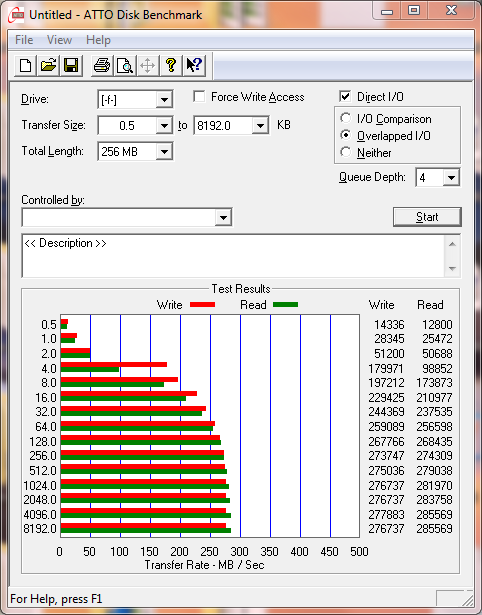ATTO Disk Benchmark is perhaps one of the oldest benchmarks going and is definitely the main staple for manufacturer performance specifications. ATTO uses RAW or compressible data and, for our benchmarks, we use a set length of 256mb and test both the read and write performance of various transfer sizes ranging from 0.5 to 8192kb. Manufacturers prefer this method of testing as it deals with raw (compressible) data rather than random (includes incompressible data) which, although more realistic, results in lower performance results.
The 4k write speed here is very good, which is expected from utilizing SLC in tandem with the LSI SandForce processor. From the results above we can note that the sequential performance of the SSD is bumping up against the limitations of the SATA II interface.
CRYSTAL DISK BENCHMARK VER 3.0.1 x64
Crystal Disk Benchmark is used to measure read and write performance through sampling of raw (0/1 Fill/compressible) or random data which is, for the most part, incompressible.
The results of testing with compressible data are on the left, and with incompressible data to the right. Interestingly enough, we begin to notice that the compressible write speeds are very close to the incompressible write speeds. This is definitely not standard behavior with LSI SandForce processors. The sequential read and write speeds are both bumping up against the limit of the interface here as well. In particular, these write scores are very good!
AS SSD is a forerunner of SSD testing, as it covers many important metrics relating to SSD performance. There are multiple testing tools that can be used, and here we will use them to highlight the ability of the Galatea to handle incompressible data. Many enthusiasts prefer this software as it encompasses the worst case scenario in disk transfer speeds by utilizing the incompressible data.
 AS SSD reveals lower results for the random read and write at the low Queue Depths, as the data is totally incompressible. In real usage scenarios most data is at least partially compressible. Of note here is the superb small 4k read latency, coming in with .072ms. For a SATA II connection with an ‘older’ processor this is quite good.
AS SSD reveals lower results for the random read and write at the low Queue Depths, as the data is totally incompressible. In real usage scenarios most data is at least partially compressible. Of note here is the superb small 4k read latency, coming in with .072ms. For a SATA II connection with an ‘older’ processor this is quite good.
 The Copy-Benchmark test is also part of the AS SSD suite. This test measures the copy speed of several types of files, a .iso, a vanilla program, and game files. These are very solid results from the SF-1565.
The Copy-Benchmark test is also part of the AS SSD suite. This test measures the copy speed of several types of files, a .iso, a vanilla program, and game files. These are very solid results from the SF-1565.
 Finally to round out the AS SSD suite we take a look at the compressible data performance. This test measures the performance of the SSD against a wide variety of percentages of compressibility.
Finally to round out the AS SSD suite we take a look at the compressible data performance. This test measures the performance of the SSD against a wide variety of percentages of compressibility.
The straight line across the various levels of compressibility is certainly not expected. This is really a very good showing as there is very little variability across the wide range of compressibility, much less than we have seen with most implementations of the SandForce processors. This type of performance again highlights the benefits of utilizing SLC, and this certainly can be a great benefit in high-write environments.
 The SSD Review The Worlds Dedicated SSD Education and Review Resource |
The SSD Review The Worlds Dedicated SSD Education and Review Resource | 

Price???
It is not a consumer product so typical pricing isn’t available but we can guarantee that it is not cheap. With such a purchase consideration, there are several configurations that can affect final sales price as can the total order amount.
Its looks like a plastic cover, susceptible to nuclear EMF?
Definitely not plastic…. If this drive weren’t valued so highly and accountable through return documentation, I might have ventured out to do a few tests… Nuclear testing would not be one of those.
where can one buy this drive?
Join the discussion…I HAVE SEVERAL PROTEUS PLUS,GALATEA 2 ,TRITON 2 AND BGA SSD AVALIBLE.
hi.Can i still get the TCS GALATEA 2 SSD or other models if it is avalible for me to get? Thank you,
john garcia